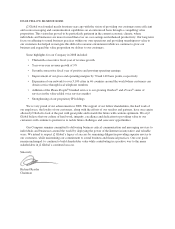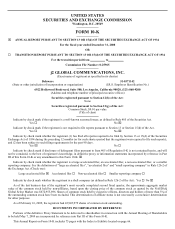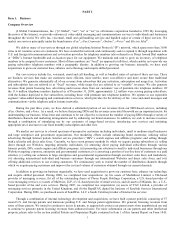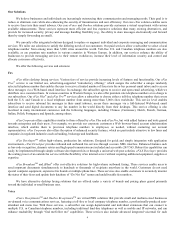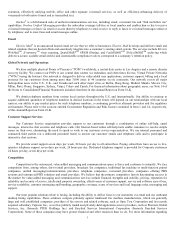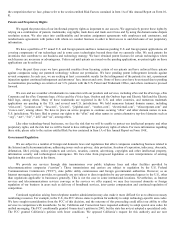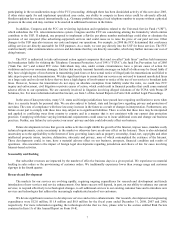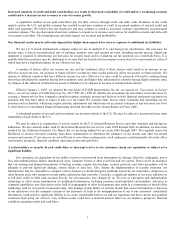eFax 2008 Annual Report Download - page 8
Download and view the complete annual report
Please find page 8 of the 2008 eFax annual report below. You can navigate through the pages in the report by either clicking on the pages listed below, or by using the keyword search tool below to find specific information within the annual report.6
the competition that we face, please refer to the section entitled Risk Factors contained in Item 1A of this Annual Report on Form 10-
K.
Patents and Proprietary Rights
We regard the protection of our intellectual property rights as important to our success. We aggressively protect these rights by
relying on a combination of patents, trademarks, copyrights, trade dress and trade secret laws and by using the domain name dispute
resolution system. We also enter into confidentiality and invention assignment agreements with employees and contractors, and
nondisclosure agreements with parties with whom we conduct business in order to limit access to and disclosure of our proprietary
information.
We have a portfolio of 57 issued U.S. and foreign patents and have numerous pending U.S. and foreign patent applications, all
covering components of our technology and in some cases technologies beyond those that we currently offer. We seek patents for
inventions that contribute to our business and technology strategy. We have obtained patent licenses for certain technologies where
such licenses are necessary or advantageous. Unless and until patents are issued on the pending applications, no patent rights on those
applications can be enforced.
Over the past three years we have generated royalties from licensing certain of our patents and have enforced these patents
against companies using our patented technology without our permission. We have pending patent infringement lawsuits against
several companies. In each case, we are seeking at least a reasonable royalty for the infringement of the patent(s) in suit, a permanent
injunction against continued infringement and attorneys’ fees, interest and costs. Some of these cases have been stayed due to pending
re-examination proceedings on certain of our U.S. patents with the U.S. Patent and Trademark Office, and others continue to proceed
forward.
We own and use a number of trademarks in connection with our products and services, including eFax and the eFax logo, eFax
Corporate and the eFax Corporate logo, eVoice and the eVoice logo, Onebox and the Onebox logo and Electric Mail and the Electric
Mail logo, among others. Many of these trademarks are registered in the U.S. and other countries, and numerous trademark
applications are pending in the U.S. and several non-U.S. jurisdictions. We hold numerous Internet domain names, including
“efax.com”, “jconnect.com”, “fax.com”, “j2.com”, “j2global.com”, “onebox.com”, “electricmail.com”, “efaxcorporate.com” and
“evoice.com”, among others. We have in place an active program to continue securing “eFax” and other domain names in non-
U.S. jurisdictions. We have filed to protect our rights to the “eFax” and other names in certain alternative top-level domains such as
“.org”, “.net“, “.biz”, “.info” and “.us”, among others.
Like other technology-based businesses, we face the risk that we will be unable to protect our intellectual property and other
proprietary rights, and the risk that we will be found to have infringed the proprietary rights of others. For more information regarding
these risks, please refer to the section entitled Risk Factors contained in Item 1A of this Annual Report on Form 10-K.
Government Regulation
We are subject to a number of foreign and domestic laws and regulations that affect companies conducting business related to
the Internet and telecommunications, addressing issues such as privacy, data protection, freedom of expression, indecency, obscenity,
defamation, libel, pricing, online products and services, taxation, content, advertising, copyrights and other intellectual property,
information security and technological convergence. We face risks from proposed legislation or new interpretations of existing
legislation that could occur in the future.
We provide our services through data transmissions over public telephone lines and other facilities provided by
telecommunications companies (“carriers”). These transmissions and carriers are subject to regulation by the U.S. Federal
Communications Commission (“FCC”), state public utility commissions and foreign governmental authorities. However, as an
Internet messaging services provider, we generally are not subject to direct regulation by any governmental agency in the U.S., other
than regulations applicable to businesses generally. This is not the case in some international locations. Nevertheless, as Internet
services and telecommunications services converge or the services we offer expand, we may face increased domestic or foreign
regulation of our business in areas such as delivery of broadband services, inter-carrier compensation and continued regulation of
competition.
Continued regulation arising from telephone number administration may also make it more difficult for us to obtain necessary
numbering resources. For example, in the U.S., the FCC allows states to petition for authority to adopt technology-specific area codes.
We have sought reconsideration from the FCC of this decision, and the outcome of this proceeding could affect our ability to offer
services in competition with incumbents. So far, California and Connecticut have requested authority to adopt special area codes for
unified messaging. The FCC conditionally granted Connecticut’s petition in 2003, but the state has not yet adopted a specialized code.
The FCC granted California’s petition with fewer conditions. We opposed California’s request for this authority and are now


